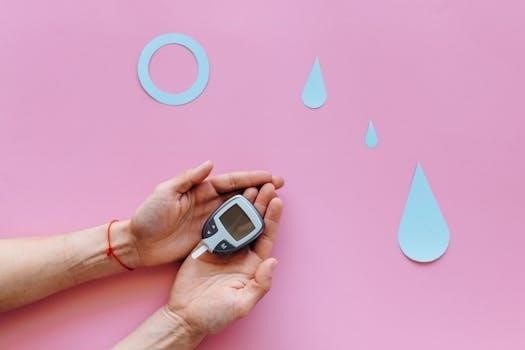Diabetes Sick Day Guidelines Overview
Diabetes Sick Day Guidelines are crucial for managing blood glucose when illness strikes. A proactive plan helps avoid complications. Being sick can elevate blood sugar levels. This affects eating habits and energy. Proper sick day management is essential for diabetics.
Importance of Sick Day Planning for Diabetics
Sick day planning is vital for diabetics because illness significantly impacts blood glucose control. When sick, the body releases hormones to fight the illness. This can lead to elevated blood sugar and ketone levels. Having a prepared sick day management strategy helps prevent dangerous complications like diabetic ketoacidosis (DKA) and hypoglycemia;
A proactive approach ensures individuals with diabetes can manage their condition effectively, even when unwell. Planning includes knowing how to adjust medication, monitor blood glucose frequently, and maintain adequate hydration. It also involves understanding when to seek medical help, making the plan a critical tool for diabetes management.

Managing Blood Glucose During Illness
During illness, managing blood glucose is critical for individuals with diabetes. Illnesses often cause fluctuations in blood sugar levels. Therefore, diligent monitoring and adjustments to medication and diet are necessary to maintain control.
Why Blood Glucose Levels Fluctuate When Sick
When you’re ill, your body releases hormones to combat the infection or illness. These hormones, such as cortisol and adrenaline, can significantly impact blood glucose levels, often causing them to rise. Additionally, illness can affect your appetite and ability to eat regularly, leading to inconsistent carbohydrate intake. If you’re not eating as usual, it can be challenging to match your insulin or medication dosage to your food intake, resulting in further blood glucose fluctuations. Furthermore, some medications, like decongestants, can also affect blood sugar levels. Therefore, illness makes managing diabetes harder.
Monitoring Blood Glucose Levels Frequently
During illness, frequent monitoring of blood glucose levels becomes essential. Check your blood sugar every two to four hours, or as directed by your healthcare provider. Keeping a close eye on your levels helps you understand how your body is reacting to the illness and treatment. This allows for timely adjustments to medication or diet to prevent extreme highs or lows. Record your blood glucose readings along with any symptoms you are experiencing. This information will be invaluable when communicating with your doctor. Regular monitoring helps maintain better control during periods of illness, minimizing the risk of complications.

Diet and Hydration Strategies
Maintaining proper diet and hydration is critical during illness. Adjust food intake if your appetite is poor. Staying hydrated is vitally important to help regulate blood glucose and prevent dehydration.
Adjusting Food Intake When Appetite is Poor
When sick, appetite often diminishes, making it difficult to maintain a regular eating schedule. For individuals with diabetes, this poses a challenge in managing blood glucose levels. Prioritize easily digestible foods that provide essential nutrients. Consider consuming smaller, more frequent meals to avoid overwhelming your digestive system. Opt for options like soup, broth, or sugar-free gelatin. Maintain consistent carbohydrate intake to prevent fluctuations in blood sugar. Focus on staying hydrated with water, sugar-free beverages, or herbal teas. Monitoring blood glucose levels becomes even more important during periods of reduced appetite to ensure stability. If you are unable to eat, contact your healthcare provider.
Importance of Staying Hydrated
Maintaining adequate hydration is crucial, especially when managing diabetes during illness. Illness can often lead to dehydration through fever, vomiting, or diarrhea. Dehydration can elevate blood glucose levels and hinder the body’s ability to regulate itself effectively. Drink plenty of water, sugar-free beverages, or herbal teas to replenish lost fluids. Avoid sugary drinks like soda or juice, as they can worsen blood glucose control. Staying hydrated helps flush out ketones, reducing the risk of diabetic ketoacidosis (DKA). Monitor urine color; pale yellow indicates good hydration, while dark yellow suggests dehydration. Aim for frequent, small sips of fluids throughout the day to maintain optimal hydration levels. If dehydration worsens, seek medical attention.

Medication Adjustments
During illness, medication adjustments are often necessary. Blood glucose fluctuations require careful consideration of insulin or oral medication dosages. Consult your healthcare provider for personalized guidance. Never stop medications without professional advice. Monitor blood sugar closely to inform adjustments.
Insulin Management During Sick Days
Managing insulin during sick days requires careful attention due to the body’s altered response to illness. Blood glucose levels can fluctuate unpredictably, often rising due to stress hormones released during sickness. Regular monitoring, every two to four hours, is crucial to track these changes. Never stop taking your insulin, even if you’re not eating, as the body still needs it to manage blood sugar.
Small, frequent doses of rapid-acting insulin may be necessary to correct high blood glucose levels. Consult your doctor for a personalized plan. Adjustments should be based on blood glucose readings and ketone levels. Staying hydrated is vital to help your kidneys flush out excess glucose and ketones.
When to Contact a Doctor
Recognizing serious illness signs is vital. Seek medical help for persistent vomiting or diarrhea. Contact a doctor if you have trouble breathing. High ketone levels also warrant immediate attention. Don’t delay seeking professional medical advice.
Recognizing Signs of Serious Illness
Identifying serious symptoms early is crucial for preventing diabetes-related complications during illness. Persistent vomiting and diarrhea that prevent food and medication intake require immediate medical attention. Difficulty breathing or shortness of breath can indicate a severe underlying condition needing prompt evaluation. Sustained high blood glucose levels, despite following sick day management strategies, also necessitate contacting a healthcare professional.
Unexplained abdominal pain or discomfort, especially accompanied by nausea, should not be ignored. Finally, if you are unable to keep fluids down or experience extreme weakness, seek medical advice. These are key indicators that require prompt intervention to avoid serious health consequences.
Preventing Complications
Preventing complications involves proactive blood glucose management. Consistent hydration aids in avoiding dehydration. A well-structured sick day plan minimizes risks. Early detection and action are vital. This ensures better health outcomes during illness for diabetics.
Avoiding Diabetic Ketoacidosis (DKA) and Hypoglycemia
Avoiding Diabetic Ketoacidosis (DKA) and hypoglycemia is crucial during sick days for individuals with diabetes. DKA results from insufficient insulin, leading to high blood sugar and ketones. Hypoglycemia, conversely, is dangerously low blood sugar. Both conditions require proactive management. Frequent blood glucose monitoring is essential to detect and address fluctuations promptly. Following a structured sick day plan helps maintain stable glucose levels.
Adequate hydration and adjusted medication dosages, as advised by healthcare providers, are vital. Consuming small, frequent meals, even with reduced appetite, aids in preventing extreme blood sugar swings. Recognizing early warning signs of DKA and hypoglycemia enables timely intervention. Consulting healthcare professionals ensures appropriate adjustments to insulin or medication regimens. Patient education and preparedness are key to avoiding these serious complications. Consistent monitoring, adherence to the sick day plan, and prompt medical consultation significantly reduce the risks associated with DKA and hypoglycemia during illness.

Resources and Support
For managing diabetes, numerous resources and support systems exist. These include diabetes education programs, materials, and healthcare professionals. Support groups and online resources offer assistance. These can help navigate diabetes care confidently.
Diabetes Education Programs and Materials
Comprehensive diabetes education programs and materials are vital for effective self-management. These resources provide essential knowledge about blood glucose monitoring, medication management, and healthy eating. Programs often cover sick day guidelines, empowering individuals to handle illnesses safely. Educational materials include guides, leaflets, and videos. They explain how to adjust insulin, manage diet, and prevent complications during sick days. Patients and families can access these resources through healthcare providers, hospitals, and online platforms. The goal is to equip individuals with the skills and knowledge to manage their diabetes confidently, especially during challenging times like illness.
